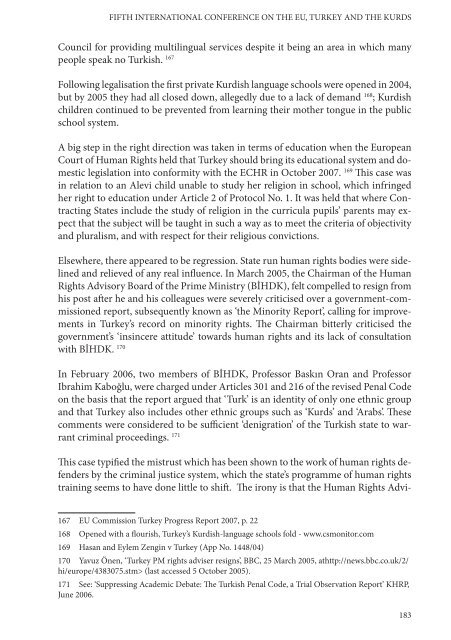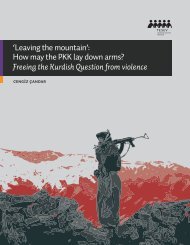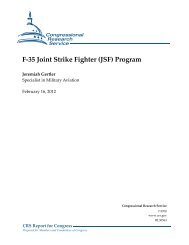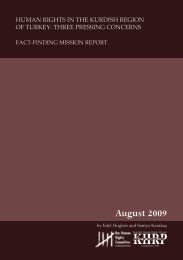FIFTH INTERNATIONAL CONFERENCE ON THE EU TURKEY AND THE KURDS
fifth international conference on the eu, turkey and the kurds
fifth international conference on the eu, turkey and the kurds
Create successful ePaper yourself
Turn your PDF publications into a flip-book with our unique Google optimized e-Paper software.
<strong>FIFTH</strong> <strong>INTERNATI<strong>ON</strong>AL</strong> <strong>C<strong>ON</strong>FERENCE</strong> <strong>ON</strong> <strong>THE</strong> <strong>EU</strong>, <strong>TURKEY</strong> <strong>AND</strong> <strong>THE</strong> <strong>KURDS</strong><br />
Council for providing multilingual services despite it being an area in which many<br />
people speak no Turkish. 167<br />
Following legalisation the first private Kurdish language schools were opened in 2004,<br />
but by 2005 they had all closed down, allegedly due to a lack of demand 168 ; Kurdish<br />
children continued to be prevented from learning their mother tongue in the public<br />
school system.<br />
A big step in the right direction was taken in terms of education when the European<br />
Court of Human Rights held that Turkey should bring its educational system and domestic<br />
legislation into conformity with the ECHR in October 2007. 169 This case was<br />
in relation to an Alevi child unable to study her religion in school, which infringed<br />
her right to education under Article 2 of Protocol No. 1. It was held that where Contracting<br />
States include the study of religion in the curricula pupils’ parents may expect<br />
that the subject will be taught in such a way as to meet the criteria of objectivity<br />
and pluralism, and with respect for their religious convictions.<br />
Elsewhere, there appeared to be regression. State run human rights bodies were sidelined<br />
and relieved of any real influence. In March 2005, the Chairman of the Human<br />
Rights Advisory Board of the Prime Ministry (BİHDK), felt compelled to resign from<br />
his post after he and his colleagues were severely criticised over a government-commissioned<br />
report, subsequently known as ‘the Minority Report’, calling for improvements<br />
in Turkey’s record on minority rights. The Chairman bitterly criticised the<br />
government’s ‘insincere attitude’ towards human rights and its lack of consultation<br />
with BİHDK. 170<br />
In February 2006, two members of BİHDK, Professor Baskın Oran and Professor<br />
Ibrahim Kaboğlu, were charged under Articles 301 and 216 of the revised Penal Code<br />
on the basis that the report argued that ‘Turk’ is an identity of only one ethnic group<br />
and that Turkey also includes other ethnic groups such as ‘Kurds’ and ‘Arabs’. These<br />
comments were considered to be sufficient ‘denigration’ of the Turkish state to warrant<br />
criminal proceedings. 171<br />
This case typified the mistrust which has been shown to the work of human rights defenders<br />
by the criminal justice system, which the state’s programme of human rights<br />
training seems to have done little to shift. The irony is that the Human Rights Advi-<br />
167 <strong>EU</strong> Commission Turkey Progress Report 2007, p. 22<br />
168 Opened with a flourish, Turkey’s Kurdish-language schools fold - www.csmonitor.com<br />
169 Hasan and Eylem Zengin v Turkey (App No. 1448/04)<br />
170 Yavuz Önen, ‘Turkey PM rights adviser resigns’, BBC, 25 March 2005, athttp://news.bbc.co.uk/2/<br />
hi/europe/4383075.stm> (last accessed 5 October 2005).<br />
171 See: ‘Suppressing Academic Debate: The Turkish Penal Code, a Trial Observation Report’ KHRP,<br />
June 2006.<br />
183





